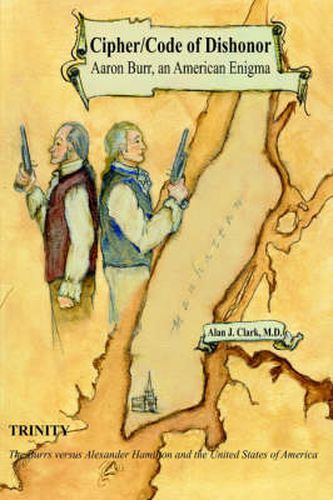Readings Newsletter
Become a Readings Member to make your shopping experience even easier.
Sign in or sign up for free!
You’re not far away from qualifying for FREE standard shipping within Australia
You’ve qualified for FREE standard shipping within Australia
The cart is loading…






This title is printed to order. This book may have been self-published. If so, we cannot guarantee the quality of the content. In the main most books will have gone through the editing process however some may not. We therefore suggest that you be aware of this before ordering this book. If in doubt check either the author or publisher’s details as we are unable to accept any returns unless they are faulty. Please contact us if you have any questions.
Trinity : The Burrs versus Alexander Hamilton and the United States of America will be the first book to draw on unreported documents and genealogical information to reveal an unprecedented look into the relationships of Aaron Burr, Alexander Hamilton, Trinity Church Corporation and the Loyalists of Manhattan Island. Author Alan J. Clark shows in new perspective the battles and intrigues leading beyond the American Revolutionary War. With the melding of genealogy and time line analysis, Clark examines some of the intriguing ciphered letters of Aaron Burr to his daughter Theodosia, and looks again at Burr’s curious and complex war time exploits to determine where his Loyalist tendencies actually began. Clark further examines the land leases then traded prior, during, and after the war as speculation, or possibly as rewards from the English Crown for services performed in its favor in the colonies primarily through the Corporation of Trinity Church. The economics of early Manhattan and the Atlantic colonies were bolstered by the complex and secular behavior of the Corporation of Trinity Church acting as land bank for the Loyalists to the Throne of England. Clark appears to fill in the gaps in many recently published tomes by delving deeper into the actions of Burr and Hamilton, examining their extensive familial connections and behaviors to arrive at a complex web of intricacy bringing to life American History at its most personal level. This book does not reiterate the well worn paths of American History. Instead, it brings a crisp new approach that makes sense of seemingly insignificant, disjointed and inconsistent stories of the early history of our country.
$9.00 standard shipping within Australia
FREE standard shipping within Australia for orders over $100.00
Express & International shipping calculated at checkout
This title is printed to order. This book may have been self-published. If so, we cannot guarantee the quality of the content. In the main most books will have gone through the editing process however some may not. We therefore suggest that you be aware of this before ordering this book. If in doubt check either the author or publisher’s details as we are unable to accept any returns unless they are faulty. Please contact us if you have any questions.
Trinity : The Burrs versus Alexander Hamilton and the United States of America will be the first book to draw on unreported documents and genealogical information to reveal an unprecedented look into the relationships of Aaron Burr, Alexander Hamilton, Trinity Church Corporation and the Loyalists of Manhattan Island. Author Alan J. Clark shows in new perspective the battles and intrigues leading beyond the American Revolutionary War. With the melding of genealogy and time line analysis, Clark examines some of the intriguing ciphered letters of Aaron Burr to his daughter Theodosia, and looks again at Burr’s curious and complex war time exploits to determine where his Loyalist tendencies actually began. Clark further examines the land leases then traded prior, during, and after the war as speculation, or possibly as rewards from the English Crown for services performed in its favor in the colonies primarily through the Corporation of Trinity Church. The economics of early Manhattan and the Atlantic colonies were bolstered by the complex and secular behavior of the Corporation of Trinity Church acting as land bank for the Loyalists to the Throne of England. Clark appears to fill in the gaps in many recently published tomes by delving deeper into the actions of Burr and Hamilton, examining their extensive familial connections and behaviors to arrive at a complex web of intricacy bringing to life American History at its most personal level. This book does not reiterate the well worn paths of American History. Instead, it brings a crisp new approach that makes sense of seemingly insignificant, disjointed and inconsistent stories of the early history of our country.